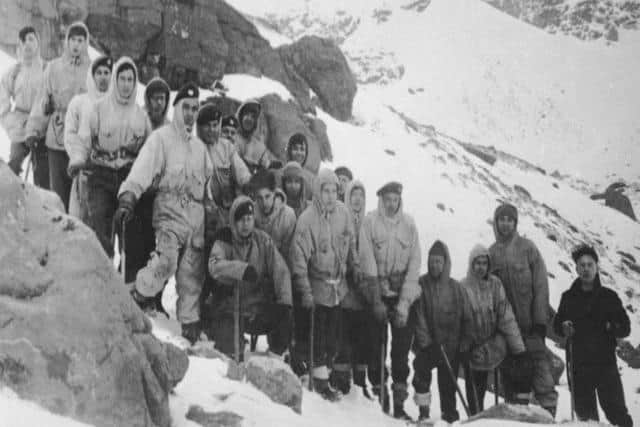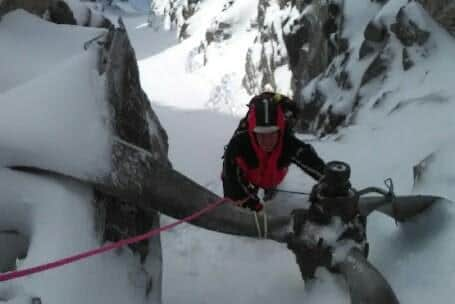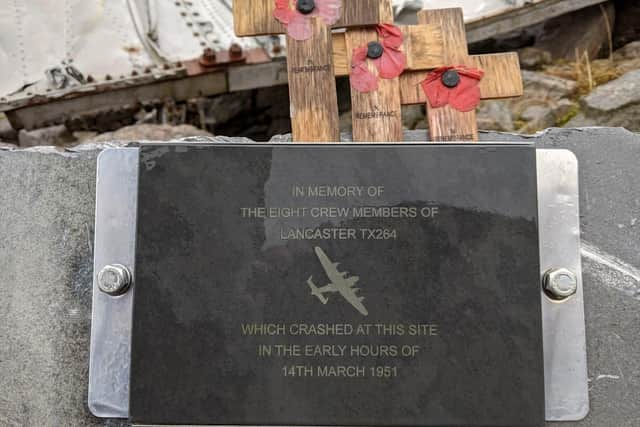How Beinn Eighe tragedy transformed Scotland's mountain rescue operations
In the early hours of March 14, 1951, all eight airmen on board Avro Lancaster TX264 perished when the converted bomber collided with the summit of 3,314ft Beinn Eighe in the Torridon region of Wester Ross.
But despite the horrific loss of life, the crash, which occurred in bad weather on what was the final leg of a night-time navigation exercise, would ultimately save lives.
Advertisement
Hide AdAdvertisement
Hide AdThe extensive search for the bodies of the eight young men, who were all aged between 19 and 29, led to a radical review of the RAF’s own mountain rescue operations.
The remote nature of the crash site meant it took three days to locate the wreck in 1951. The recovery operation took several weeks and required the help of a Royal Marine Mountain Leader who possessed the winter climbing skills needed to navigate the challenging terrain.
This weekend, to mark the 70th anniversary of the tragedy, RAF Lossiemouth’s Mountain Rescue Team will commemorate those who died by conducting training on base.
The team had intended to climb the gully where the aircraft crashed, as the remaining aircraft parts now serve as way points for mountaineers. However, due to Covid-19 restrictions, they will only deploy for operational purposes.


The anniversary of the crash that killed eight members of the Lancaster crew serves as a reminder of the importance of the mountain rescue team.
RAF Lossiemouth Mountain Rescue Deputy Team Leader, Sgt Ali Beer said: “It’s a shame we can’t climb the gully this year. It is an important part of RAF Mountain Rescue history and our training.
"This is when we remember our past and focus on being able to conduct Aircraft Post Crash Management in any terrain or weather. However, we understand the importance of adhering to restrictions.”
Public criticism, particularly from mountaineering groups, of the time taken to recover the eight airmen, prompted a full overhaul of the RAF’s mountain rescue operations, ensuring that teams attending future emergency incidents would be provided specialised personnel, as well as adequate training and equipment.


Advertisement
Hide AdAdvertisement
Hide AdAs a result of the Beinn Eighe tragedy, RAF mountain rescue personnel now receive annual courses in winter and summer climbing techniques so they can deploy readily to any mountainous region or challenging situation they may face. This was seen over the winter months in Moray as the Mountain Rescue Team protected road users from dangerous drifting snow and freezing conditions.
Parts of the fuselage of Lancaster TX264 can still be seen scattered around the scene of the 1951 crash site, including propeller blades and other twisted bits of aircraft.
Sgt Beer added: “The crash site still contains large amounts of wreckage and forms a very atmospheric winter climb known as Fuselage Gully.
"On the climb the mountaineers navigate through parts of the wreck. Further wreckage can be found at the foot of the mountain where a plaque to the crew was laid by the team.


"We look forward to being able to take our newest members on this challenging climb in the future.”
A message from the Editor:
Thank you for reading this article. We're more reliant on your support than ever as the shift in consumer habits brought about by coronavirus impacts our advertisers.
If you haven't already, please consider supporting our trusted, fact-checked journalism by taking out a digital subscription at https://www.scotsman.com/subscriptions.
Comments
Want to join the conversation? Please or to comment on this article.